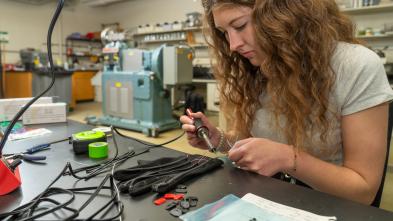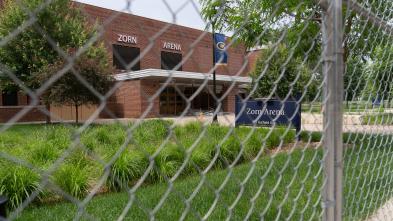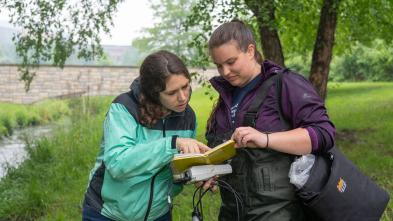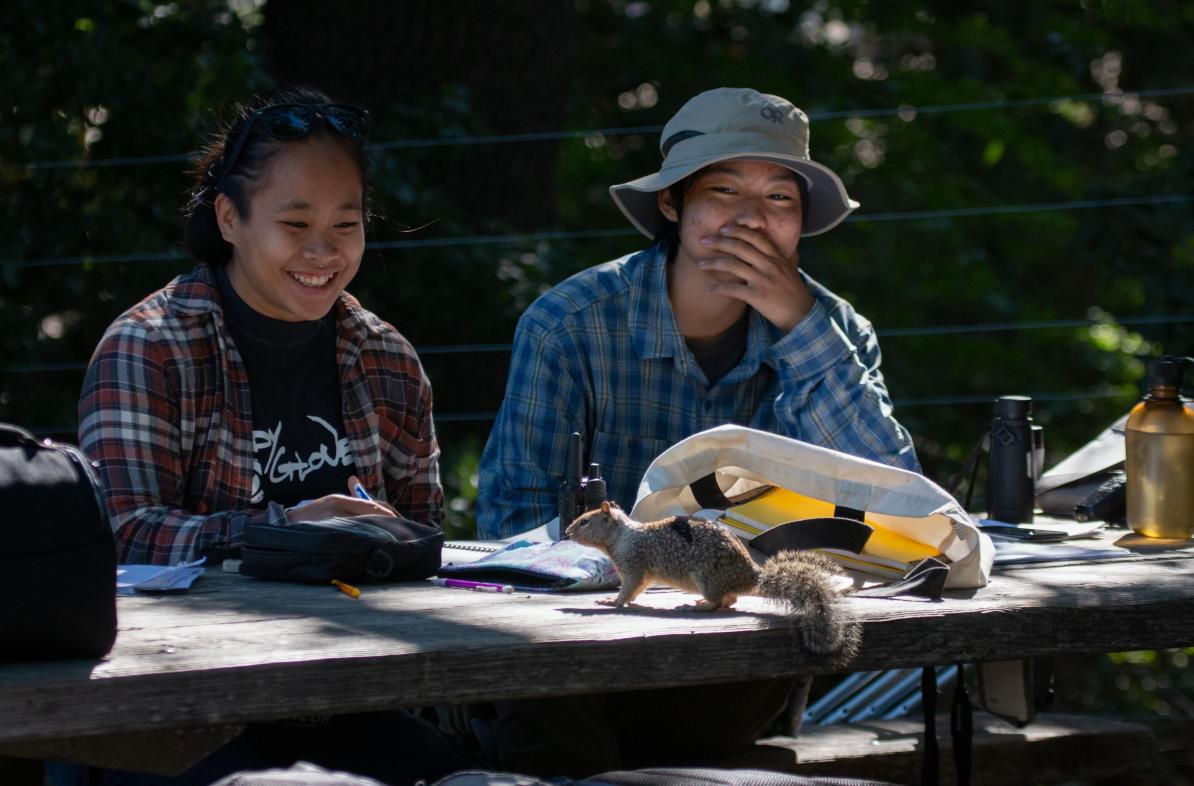
UW-Eau Claire biology team collaborates with University of California on field research
When Dr. Jennifer Smith joined the University of Wisconsin-Eau Claire biology department in 2022, she brought to the program an exciting focus on animal behavior and ecology. She also brought a unique opportunity for Blugolds to join her decade-long field research studying small mammals in California.
“I’ve been conducting behavioral research on California ground squirrels for over 10 years,” Smith says. “Inviting my new students to join this work has been exciting.”
The site of Smith’s research is in Briones Regional Park in the San Francisco Bay Area. There, faculty, research scholars, and undergraduate and graduate students from multiple institutions observe and repeatedly sample individuals from two distinct ground squirrel populations that differ in their exposure to human activity.
Why California ground squirrels?
“These are not the squirrels we see here in Wisconsin. They are larger and have a much more complex social structure than species found in this part of the country,” Smith says.
The various data sets collected by Smith and her student team include behavioral, physiological and genetic samples that can help people understand the causes and consequences of mammalian social evolution as well as the impacts of humans on wild animals.
“One of the populations we study has significantly more exposure to humans and dogs than the second population in the park, so comparing data between populations can answer important questions about their overall health and behavior patterns,” Smith explains.
Smith further explains that the study has followed specific ground squirrels year after year. The researchers have extensive data on nearly all aspects of the social lives and associated life history as well as physiological and genomic information for marked individuals across their lives.
Smith says, “Our major goals over the next five years include using long-term data and manipulative field experiments to reveal: 1) how humans and dogs influence the stress physiology of squirrels; 2) the role of social learning in development; 3) whether fear responses are consistent over space and time; and 4) the social and ecological correlates of survival and reproduction.”
Smith’s study is conducted in collaboration with fellow animal behavior and ecology experts Dr. Andy Sih and Dr. Sonja Wild at the University of California, Davis, and Dr. Eileen Lacey at the University of California, Berkeley.
Bringing Blugolds on board
Last summer, Blugold students joined the field crew as paid research assistants and spent two months collecting data and samples that the team have begun to analyze. Smith is proud to have added a new immersive undergraduate research experience at UW-Eau Claire, one that offers an unprecedented opportunity to collaborate with prestigious Research 1 universities.
“My undergraduate collaborators are engaging in immersive research that is typically reserved only for graduate students at other universities.”
Smith says these students engage in all aspects of the research, including:
- Generating hypotheses to explain natural phenomena.
- Collecting and analyzing data to answer novel questions.
- Presenting findings to broad audiences at regional and national meetings.
“In a world bombarded by technology, this research allows students from varied majors and backgrounds to travel to California and conduct authentic field research. They connect with the natural world in a new setting by live-trapping and observing individually marked ground squirrels repeatedly over time,” Smith says.
Students on this team commit to 5-10 hours of research weekly (outside of summer fieldwork) and are paid through a variety of research support programs at UW-Eau Claire. From biology department funds to institutional research and diversity grant support, UW-Eau Claire finds ways to financially support students seeking high-impact experiences like collaborative research.
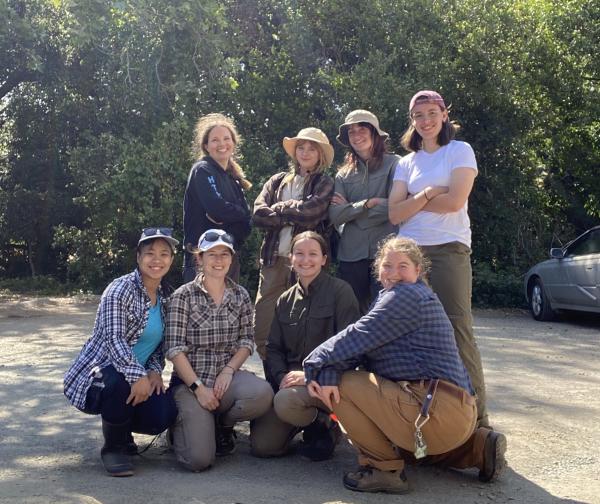
Sharing their "squirrely" research experiences
We asked a few members of UWEC’s Team Squirrel to talk about the field experience and the overall project to give fellow students a better idea about all the ways this experiential learning can impact the student journey.
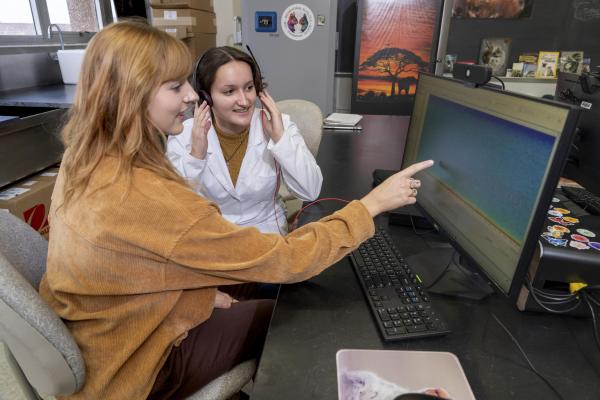
Grace Wainwright, left, and Maddie Mueller identify environmental factors that influence squirrel behavior by matching up moments in audio recordings with squirrel sounds and behavior recorded on the same timeline.
Grace Wainwright, senior biology major from Port Byron, Illinois
How did you get involved in this research?
I learned about Dr. Smith’s California study while taking her ecology course in fall 2022. Her field of animal behavior already interested me, so I applied to the Biology Research Scholars Program and was accepted to work with her during the semesters and an Office of Research and Sponsored Programs grant funded my fieldwork in California.
Since last spring I’ve been analyzing the recording of ground squirrel alarm calls, trying to determine what factors might have been at play during each instance.
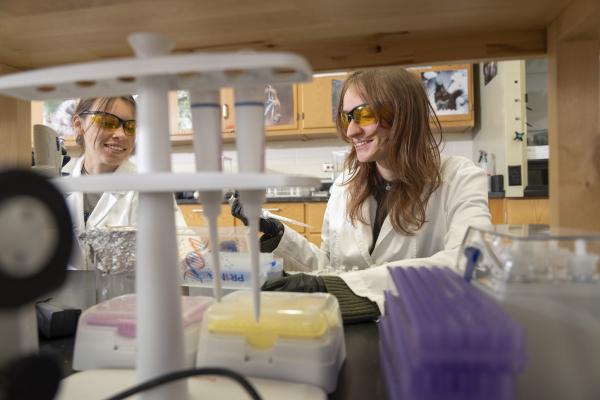
Ilka Malin, left, and Ellie Williamson prepare fecal matter slides for examination under the microscope. The study of fecal matter helps determine the overall gut health of ground squirrels.
Ellie Williamson, senior ecology and environmental biology major from Dripping Springs, Texas
What element of the California fieldwork was most surprising to you?
Field research kept us on our toes. Some on-site faculty roles sometimes changed on the fly and one time I even got to observe a rattlesnake versus squirrel standoff. How cool! While gaining strength in adaptability, we were all able to learn and grow as a team and successfully completed our goals for the summer.
Ilka Malin, a senior biology major from Mount Horeb
Was the field research aspect of this project a draw for you? Describe the overall experience from that perspective.
Honestly, the research experience really affirmed my love of fieldwork and data collection. Days went by so fast. It was motivating every day to wake up and know that I would spend my day outside working with my friends on a project that I enjoyed and felt responsible for. I had been craving an experience where I could work on skills outside of the classroom and get a better grasp on my areas of interest in biology.
I graduate in May and am confident that this experience set me apart from my peers as a graduate school applicant.
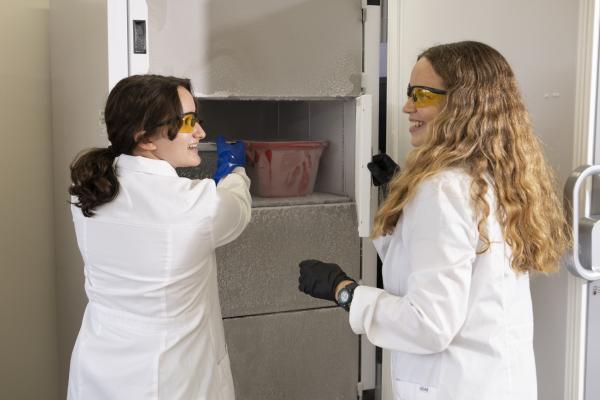
Maddie Mueller, left, wears protective gloves to retrieve squirrel DNA samples from the freezer for examination. Samples collected over the summer months are stored at temperatures of -80 degrees Celcius to best maintain tissue integrity.
Maddie Mueller, a junior ecology and environmental biology major from Holmen
How has this research project shaped or furthered your long-term goals in school or career?
The field of animal behavior is an option that I was considering, but this project has sparked my interest in a career in research science. I’ve acquired new field and lab skills that I will be carrying with me to future jobs and research opportunities. In collaboration with Dr. Smith, I am a named co-author on a publication titled “Mechanisms of Equality and Inequality in Mammalian Societies.”
Being published in an academic journal as an undergraduate student is rare and will give me a competitive edge in job or graduate school applications. Team Squirrel will also be presenting research at UW-Eau Claire's Celebration of Excellence in Research and Creative Activity to discuss our findings in the field. It’s a great opportunity to practice presenting research to an audience unfamiliar with the topic.
Tia Ravara, senior biology and environmental geology double major from San Leandro, California
Was this your first collaborative research project at UW-Eau Claire? How would you describe your experience overall?
This is my first major research project and I will continue this work as part of my McNair Scholar project next summer. I’m a student-athlete, a gymnast, and being paid to conduct research was a way to fit in this kind of experience and be able to pay my tuition and other expenses. I’m paid to do things I love and want to continue in my future!
This research site was only 45 miles from my home in California, so I was familiar with the area, but the exact field site was a new place to explore. I enjoyed being outside and observing wildlife in their natural habitats, while gaining insight about conducting research on both our small Blugold team and a larger team, including graduate students and professors from other universities.
Smith says, “I’m so proud of all Team Squirrel has accomplished over the past year and am thrilled to support the next decade and more of behavioral ecology research on social mammals!”
To learn more about this study, visit Dr. Jennifer Smith's research website.
To learn more about avenues for paid research opportunities for students at UW-Eau Claire, speak to faculty in your major department and/or in the Office of Research and Sponsored Programs.
See the funding opportunities for undergraduate research at UW-Eau Claire.
You may also like
